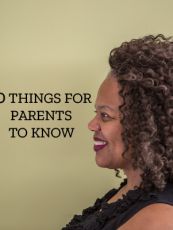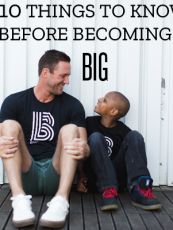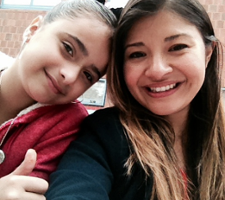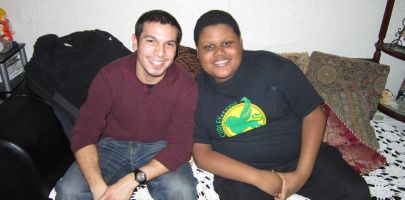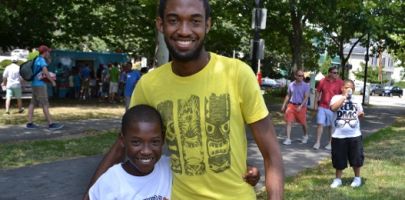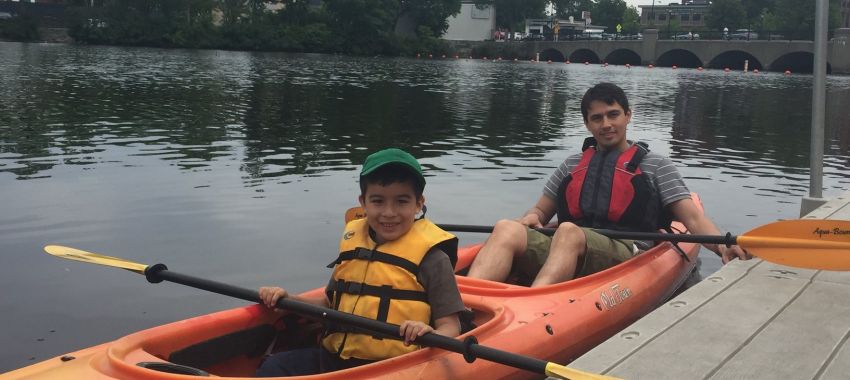
Real Life Mentoring Story for Hispanic Heritage Month: Luis and Randy
Happy Hispanic Heritage Month! From September 15 to October 15, the United States will be celebrating the heritage and contributions of Hispanic & Latino Americans. As an agency that serves over 800 Latino Littles, we thought it would be important to celebrate with Hispanic Mentoring themed blogs throughout the month! This week, we’re kicking things off with Luis and Randy who have been matched since February of this year and are both of Hispanic descent. Read their inspiring story below!
1) Initially why did you sign-up to become Big Brother?
When my wife joined the staff at BBBSMB, we often spoke about the work she does and after about 6 months, we both decided we wanted to take part in the program. We both identified strongly with how the program is run. The idea of aiming for the volunteer’s time and not his/her money is very appealing. Once it is clear that the impact of this experience in the Little’s life is for the long term (or later in the medium/far future) and not short term, it immediately allows the volunteer to immerse himself/herself in the present and just enjoy the company of a kid.
We felt we could be a good match for the type of volunteers the program looks for, because we don’t have kids yet, we are young professionals, and we would like to volunteer our time, which is ultimately what the program really needs from volunteers: time.

2) Have you seen a change in yourself since the beginning of your friendship with Randy? Have you noticed any changes since you were first matched?
I don’t think I have seen major changes in me yet. We’ve only been matched for a few months, but I have no doubt that he will as our friendship progresses and we begin to share more experiences together. I have definitely seen changes in Randy, though. He has become a more outgoing kid, not as shy, willing to speak his mind and compromise on situations he otherwise would not in the past. It is fascinating to see how he adjusts to situations he would like to see happening differently i.e. having to eat his ice cream only after he is finished with his lunch (including his salad) when we are eating together.
3) In your match, how important is it to be able to communicate with your Little’s mother in Spanish?
It’s extremely important. I can see how language can create a barrier with a Little’s parent, so in this case it makes my interactions with his family much easier because we can communicate in Spanish. In my opinion someone who really wants to volunteer, but does not have the language skill, can for sure overcome the barrier and interact with their Little’s parent. However, things do flow much easier when the volunteer speaks the parents’ native language.
4) How has Match Support been helpful in your role as a Big and your friendship with your Little brother?
Match support has been checking on how our friendship is progressing, suggesting activities for us to do, and making sure that both my Little, his family, and I are comfortable with how things are evolving. I particularly enjoy the fact that Match Advocates are there whenever they’re needed and try not to be invasive, allowing the friendship between Bigs and Littles to naturally evolve.

5) What type of outings have you guys done? What have you learned culturally from your Little? The differences, and how that has made you better understand your Little.
We’ve gone to the park, the aquarium, the science museum, kayaking, and his favorite place; the movies. Our outings are really great because we get to literally just hang out and get to know each other, which I personally believe is the key to making any friendship work. The more time we spend together the better I understand him and his family and vice versa. I feel this is a fundamental aspect of the program, to have both the Little and Big exposed to individuals/situations they otherwise would not be involved in.
6) What advice would you give other Hispanic/Latino adult who may be hesitant to become a positive role model to the Littles? Why is there a need for more role models, especially in the Latino Communities?
My advice is to first decide if they really want to do it. They may not know what to do with a Little or how to go about it, but if they really want to do it things will fall into place. Once that question is answered then my advice is to make sure every time they’re meeting with their Little, make a conscious effort to have a good time and make sure that they’re both enjoying each other’s company. If not, then talk openly about it until there is an agreement of something to do that they will both enjoy. Like any other friendship, communication is key and never forget that this experience is a two-way street, where the Little learns as much from the Big as the Big does from the Little.
7) Growing up did you have any mentors? How important do you see mentoring in the Latino community?
I didn’t have formal mentors growing up, but my parents were always present, providing advice and a wonderful environment to develop. I never felt the need for a mentor when I was a kid because my parents had built a wonderful network around me (teachers, coaches, friends, etc) where I could explore different opportunities and look for activities to do and invest my time in.
I think this speaks more to my fortunate childhood conditions and not about the importance of a mentor in someone’s life. I am in a position where I understand how a mentor can drastically impact someone’s life when conditions (social, psychological, economic, etc) are not ideal, hence the importance of programs such as Big Brothers Big Sisters.
Mentoring is extremely important, not only in the Latino community, but across our social fabric. Any community that is at a disadvantage, in any degree, shape, or form, can benefit from having mentors/volunteers donate their time and knowledge to help the community members seek opportunities in which they can thrive and succeed.

Children s safety is our number one priority; throughout the duration of the match, not just the beginning!
Download this essential fact sheet to help prep for the volunteering process.
